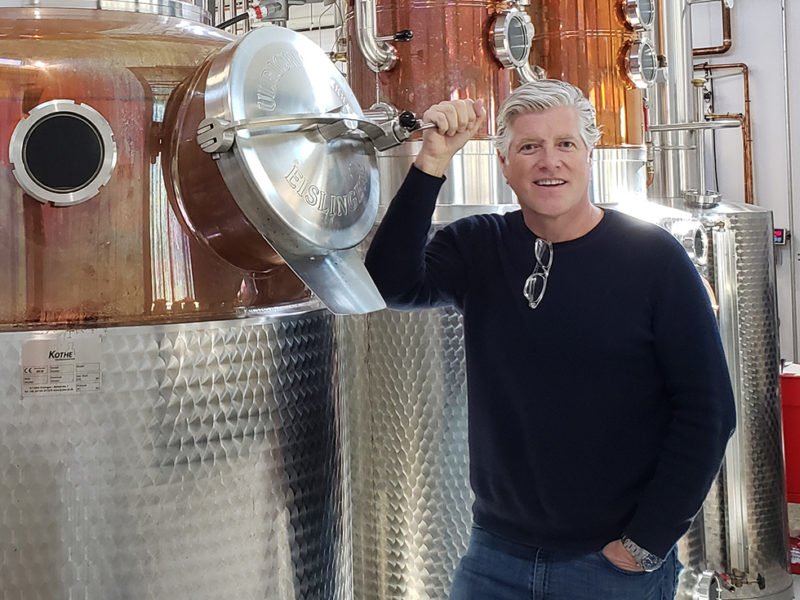KELOWNA – A retired accountant from Vancouver has given a mature orchard a new lease on life with a vodka that’s finding a niche in local and international markets.
Blair Wilson and his wife moved to southeast Kelowna about 10 years ago after several business ventures in Vancouver and a career in federal politics, including sitting as the Green Party of Canada’s first-ever MP. The couple settled on a 20-acre parcel that came with 6,000 Ambrosia and about 300 Spartan apple trees. Not one to relax, Wilson took up farming. The fruit was sold to BC Tree Fruits Co-op.
“I never realized how hard being a farmer is until then,” says Wilson, a self-proclaimed entrepreneur.
When he saw the returns he was getting for the fruit, he decided there must be another opportunity. He explored making cider but the cost of canning was prohibitive. Instead, he settled on vodka production after chatting with a copper still manufacturer at a whiskey conference in Seattle.
He hired a chemist to figure out the right components for a winning recipe, including a proprietary yeast. Wilson’s apples plus apple concentrate from Kelowna’s Sun-Rype juice plant now underpin two premium apple vodkas: Rebel, which is distilled 25 times, and Forbidden Spirits, distilled 50 times. Added distillations remove impurities and create a smoother-tasting end product.
“Typical vodkas tend to be distilled between three and 10 times,” he explains.
It takes about 25 pounds of apples make one 750-ml bottle of Rebel.
Wilson opened a production facility and tasting room in 2019 and recently received a lounge licence for a 75-seat outdoor patio. Additional tanks were added this spring to accommodate orders he’d been working hard to negotiate from the European Union and China.
“When you have a great-tasting, quality product that’s made in Canada, foreigners are willing to buy. They love the Canadian reputation of being safe and producing things that are safe, clean, and good for you, and that’s helped with marketing,” he says.
But exports demand attention to details quite different from the local market.
“Each country and even each port sometimes has different rules about importing alcohol,” says Wilson. “Navigating the continually shifting sands of economic politics and trade, like Brexit, also takes persistence and agility.”
On the plus side, he says a free trade agreement with Europe means products from Canada don’t face the 25% tariff that US products do. China’s palate for alcohol is also changing from sweeter to dryer, creating opportunities there as well. This spring, Wilson and his wife were booked to be part of a trade mission to South Korea organized by the BC government but it was cancelled due to COVID-19.
That’s not the only change in plans the distillery has faced this spring.
In April, Forbidden Spirits retooled its processing to meet an emerging demand brought about by COVID-19 for industrial-grade alcohol for hand sanitizer, joining the likes of Okanagan Spirits, Wise Acre Distillery and others across the province.
Wilson says the speed of the approval process for the switch amazed him. He put his application in with the federal government to produce alcohol for sanitizer one day and received a phone call from them the next.
“We have all the paperwork done and the licences and continue to work to source bottles, which is the common challenge. I’ve managed to find some in Kentucky,” he says.
Provincial regulations allow production through July 15.
With the new business model, including sanitizer give-away days for the public, Wilson hopes to at least break even without the usual tasting room traffic and overseas sales, both on hold due to COVID-19.
With an estimated daily production of 1,000 litres of sanitizer, he looks forward to rehiring staff laid off in early March when normal business halted. He’s thankful the federal government is providing a 75% subsidy for small business wages to help him make payroll and help cover interim carrying and operating costs during the crisis.
While they are still selling vodka locally, foreign orders are on hold, but there is vodka in tanks ready when the crisis passes.
Wilson is also working to put together a Canadian Craft Spirit Association, a national group that will lobby for changes to the $3.51 federal excise tax per bottle that craft distillers have to pay when producing limited quantities using local Canadian agriculture products.


 Victoria food hub gets funding
Victoria food hub gets funding